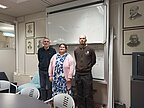

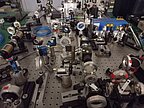

The first secondment of the Q-DYNAMO project by the project coordinator Dr. Kirova visiting all the EU partners in Italy and Germany
Scientific activity during the secondment from 05.03.2024 to 14.03.2024 in Parma, Italy included mutual introduction of the Parma and Riga teams by extensive discussions of their current research directions. Work was started on the theoretical models for WP1 "Quantum control via the Autler-Townes effect”, in particular - on the topic of all optical spin-switch in molecular systems.
Scientific activity during Dr. Kirova’s secondment from 15.03.2024 to 24.03.2024 in Pisa, Italy included introduction to the team and a tour of the experimental laboratory, as well as work on the theoretical models of quantum interference in closed atomic systems, which is related to the topic of quantum computing.
Scientific activity during the secondment from 25.03.2024 to 04.04.2024 in Ulm, Germany was devoted to the topic of WP2 "Coherent control of cold atoms and molecules". After an extensive tour of the three experimental laboratories at Ulm University, Dr. Kirova performed work on Task 2.3 "Theoretical studies of coherent control of ultracold chemical reactions”. In the course of this work, a synergy with WP3 "Experimental realization and control of quantum emitters" was noticed in terms of the theoretical and numerical modelling, thus Dr. Kirova also contributed to the development of the theoretical side of WP3.
To introduce Riga’s team research directions Dr. Kirova gave a presentation entitled "Quantum and Nonlinear Optics in Atomic and Molecular Systems", thus contributing to WP5 "Management, communication and dissemination activities”.
In addition, as a project coordinator, Dr. Kirova participated in the coordination of the secondments’ plan from the EU teams to the rest of the consortium participants until the middle of 2025, which is connected to the implementation of WP5 "Management, communication and dissemination activities".
The leader of the Ulm University team Prof. Dr. Johannes Hecker Denschlag visited partnering teams in Italy: University of Pisa and University of Parma for initial introduction of the teams, discussions concerning the research WPs, as well as coordination of the secondments’ plan until the middle of year 2025
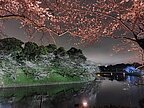
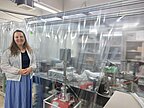


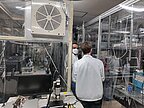

01.04.2024 – 30.04.2024 Rita Veilande visited the Nano Transport Laboratory led by Mark Sadgrove at Tokyo University of Science, one of the Japanese partners in the HE-MSCA-SE Q-DYNAMO project.
Got familiarised with the experimental studies conducted there, including on the attachment of gold nanoparticles to the nanofiber and their control. Discussed the publication of L.Ostrowski, S.Parkins, M.Shirane, M.Sadgrove "Interference-induced directional emission from an unpolarized two-level emitter into a circulating cavity", Phys. Rev. A 105, 063719 (2022), the realisation of the proposed idea, especially the theoretical modelling of the process of coupling a quantum emitter and an atom to a nanofiber cavity, which would allow controlling the direction of the emitted photon. This publication was specifically studied to understand the proposed theoretical model and learned the descriptive formalism of quantum mechanics using the system density operator and operators in Hilbert space, which is particularly useful for describing such quantum optical systems. It was modelled at what parameters the best directionality of a photon in the cavity would be. An attempt was made to understand whether and how much a quantum dot and an atom are entangled in a such resonator; and how it relates to the controlled direction of the emitted photon.
Rita Veilande informed the laboratory staff and students about her research conducted at the Laboratory of Theoretical Physics of the Institute of Atomic Physics and Spectroscopy, University of Latvia.
All activities during the visit were accomplished within the framework of the 3rd activity "Experimental realisation and control of quantum emitters" of the project "Quantum dynamics control of atomic, molecular and optical processes".
Additionally, R.Veilande visited and briefly got acquainted with the research and its progress at the University of Electro-Communications of the other Japanese Q-DYNAMO project partner – laboratory led by of the Kali Prasanna Nayak.
The leader of the Ulm University team Prof. Dr. Johannes Hecker Denschlag visited the parnter organisation at University of Colorado from 2 August to 13 September 2024.
During his stay Prof. Denschlag worked with the host Dr. Jose P. D'Incao on WP2 "Coherent control of cold atoms and molecules", investigating the theoretical and experimental aspects of the possible processes involved in ultracold chemical reactions
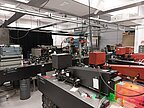
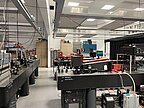
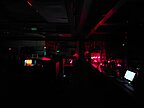
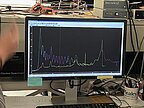
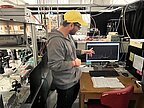
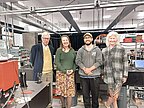
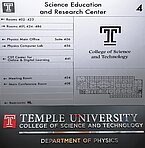
Rita Veilande and Dina Bērziņa are visiting Temple University in Philadelphia: College of Science and Technology, Department of Physics
Prof. Denschlag visited the Sadgrove lab at Tokyo Univesity of Science to explore the experimental realization of control of ultracold chemical reactions in cavities
PhD student from University of Parma Ivan Saychenko visits the experimental team of Dr. Mark Sadgrove at Tokyo Unversity of Sciences to tackle the theoretical aspects of long-range interactions between quantum emitters

 Academic Centre
Academic Centre